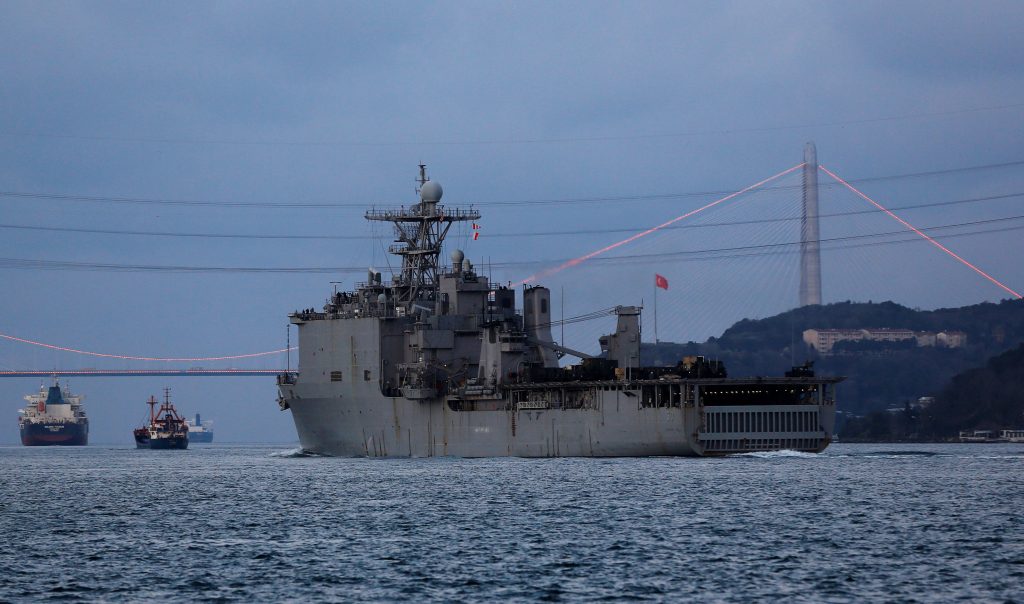Arnold C. Dupuy

This wasn’t always the case. The early post-Cold War era could be seen as a “golden age” of US-Black Sea engagement, when Washington’s support for the newly independent former Soviet states of the region included promoting democratic transition, non-proliferation, demilitarization, and free market reforms. Perhaps the most effective display of its determination during this period was helping Azerbaijan, a major regional oil and gas producer, to become independent of the Russian energy infrastructure by facilitating the Southern Gas Corridor and the Baku-Tbilisi-Ceyhan oil pipeline. Those provided Europe with non-Russian oil and gas while allowing Azerbaijan and transit nations Georgia and Turkey to benefit.
But those days are long gone. Recently, a retired diplomat from the region privately lamented to me that the United States is now “invisible” in the Black Sea. Similar sentiments have been expressed by other leaders and regional experts. Arguably, Washington’s abandonment began after the September 11 attacks, while others claim the US “pivot to Asia” distracted its attention. Regardless of the blame—which transcends both political parties—greater US-led pushback to Russia’s 2008 invasion of Georgia and illegal annexation of Crimea in 2014 could have deterred President Vladimir Putin from his most recent Ukrainian adventure.
The result for the Black Sea region is a vacuum that Russia, China, and Iran have been happy to fill. While Russia’s historical dominance is more deeply entrenched, Beijing’s Belt and Road Initiative has the potential to challenge Moscow’s status there. Although the weaker of the three, Iran leverages both overt and covert means to play a greater role at the expense of the United States and broader regional security. All this erodes Washington’s longstanding role as Europe’s primary security guarantor.
Today, however, Russia’s invasion of Ukraine presents an opportunity for Washington to reengage and redirect its focus in the region. For instance, a post-war Ukraine will need to be rebuilt, while other Eastern European countries shaken by the Russian invasion will spend big on defense and related infrastructure. US leadership should include the application of both soft and hard power; the latter in the form of weapons sales, joint exercises, and military-to-military exchanges, and the former through ever-stronger sanctions against Russia as well as commercial ventures with Black Sea nations. These ventures could include loan guarantees and lines of credit to rebuild, expand, and strengthen infrastructure.
But for any successful re-engagement effort, the United States will need tacit Turkish cooperation that will require Washington to repair relations with Ankara. Having simmered for years, these tensions are complex and rooted in Turkey’s frustration with US support for Kurdish People’s Protection Units (YPG) militants fighting the Islamic State and arms embargoes over the purchase of Russian S-400 air-defense systems. Ankara’s acquisition of the latter led to its expulsion from the F-35 fighter jet program, while US reluctance to sell and upgrade F-16s for Turkey has further inflamed tensions. For its part, Washington is concerned by Turkey’s illiberal drift and its operations in Syria against the YPG.
Central to any US-Turkish rapprochement will be to focus on areas of common interest—notably the central theme of regional stability and both nations’ respective roles in securing it. Washington should make clear that its wider re-engagement in the Black Sea will complement Turkey’s regional aspirations, not be seen as challenging them. The war in Ukraine has reinforced Turkey’s geostrategic importance, and Ankara has re-emerged as a natural counterbalance to Russian power in the region. A cornerstone of this dynamic is Turkey’s continued engagement with NATO, which has benefited from its membership in the Alliance and reinforced its own security. Indeed, a Turkey firmly embedded in NATO, working in cooperation with the United States operating as an honest broker, is vital to long-term regional stability. Ultimately, both parties must recognize that neither side will get exactly what it wants and move forward with what it can secure.
A wider Black Sea region under pressure from Russia, China, and Iran can only lead to greater instability on Europe’s southeastern flank, further jeopardizing Washington’s broader strategic goals. US support to Ukraine has been positive—but was slow in getting started and still falls short of what Kyiv needs. Now that Ukraine has demonstrated the battlefield prowess to stop and push back the Russian forces, military and economic aid should be accelerated and enhanced. US support to Ukraine should be the impetus for even greater regional engagement. Washington must recognize that redirecting attention to the Indo-Pacific cannot be accomplished at the expense of its traditional transatlantic relationship. In the Black Sea, it has not had a long-term regional vision for nearly two decades, but it must finally wake up to the challenge.
No comments:
Post a Comment